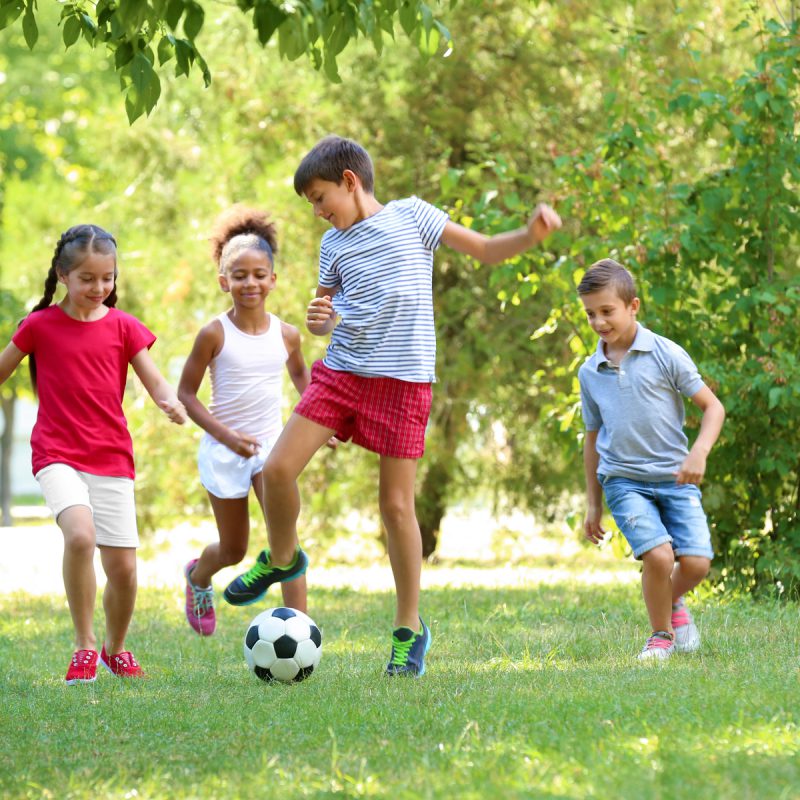Marco, Polo. Remember when this was a real, live game? Remember the excitement (and the splashing) when you got close to catching someone? And those long nights when the fireflies were the only lights as you played “Ghost in the Graveyard?” Those were real games, played in real life, without electronics.
As we’ve lost touch with some of these outdoor games, it seems we’ve lost touch with ourselves. A recent study shows that the average U.S. child spends five to eight hours in front of a screen each day. That’s up to half of their day. Not to mention the time they spend being shuttled to various preplanned and highly structured activities.
The Seattle Children’s Research Institute conducted a study that found that children ages 10-16 spend just 12.6 minutes of their 10.4 waking hours on vigorous outdoor activity. That’s only two percent of their day!
Regain Outdoor Play
What’s causing this? Several things. Our “helicopter parenting” approach has encouraged many families to keep their children indoors. And screens have also lured children inside.
Indoor activities have value too. Reading helps build the imagination, stimulates the brain, boosts memory and concentration, and even relieves stress. And building a fort, or just contending with boredom, are both good creativity starters. While there are definite benefits to indoor play and regimented scheduling, the challenge is that indoor and regimented play are vastly outpacing the time spent playing outside, free from structure and screens.
Why Is It So Important to Get Outside?
There are some real, measurable benefits to outdoor play:
- Increased physical fitness: Outdoor play fosters higher levels of physical activity as children interact with a larger environment.
- Stronger eyesight: Sun exposure helps strengthen eyesight, since pupil restriction boosts farsightedness by “training” the muscle, countering the growing rate of nearsightedness.
- Additional health boosts: Children reap the benefits of Vitamin D, which protects against bone weakness, diabetes, cardiovascular disease, and more.
- Better gross and fine motor skills: Children learn to move objects in a true space, not an online one. This aids spatial awareness too.
- Higher quality sleep: Nature sets our circadian rhythms best; the blue light from screens resets it.
- Increased cognitive function: Being immersed in nature and increasing children’s fitness actually boosts mental acuity.
- Stronger creative muscle: Being outside encourages creativity, since there aren’t set “tasks” to accomplish like in a video game, and children originate thought more than when they’re passively watching a screen.
- Better social networks: Being outside encourages group play over solitary play and allows for more interaction and chances to make friends.
- Decreased depression and hyperactivity: Nature calms and also stretches attention spans due to its slower pace.
- Overall better quality of life: Being outside actually increases our life spans and strengthens our health throughout our lives.
So fresh air isn’t the only boon.
Get Outdoors More!
It seems easy enough. We need to shoo our children (and ourselves) outside more. Sometimes, it’s more than just saying we’ll go outside and play. We need to change habits, collect cell phones and other devices, and make ourselves present with the children to set the example ourselves. Here are some intentional ways to get in touch with nature (and ourselves) again:
- Make a green hour – just one hour a day, outside
- Go agenda-less and get bored; then get busy!
- Grow a garden
- Weed
- Go on a scavenger hunt
- Go to the playground or a park
- Have a picnic
- Watch the birds, bugs and other animals
- Walk
- Walk the dog
- Ride a bike
- Take a hike
- Build a fort
- Draw with chalk
- Blow bubbles
- Fire up the sprinkler
- Kick a ball around, throw a ball around, hit a ball around
- Roll in the grass
- Do cartwheels
- Slip and slide
- Climb a tree or a treehouse
- Sit in the sun or the shade
- Read outside
- Enjoy!
There’s a reason why your grandma told you to eat a peck of dirt before you die. It will actually help you live longer – and you’ll have fun too!

